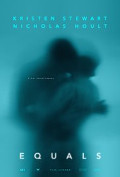
Directed by
Drake Doremus
101 minutes
Rated M
Reviewed by
Bernard Hemingway

Equals
Although in terms of scripting Equals adds nothing new to the large catalogue of dystopian sci-fi films, indeed it immediately suggests George Lucas's 1971 classic, THX 1138, with its similar vision of a closed society and two lovers who try to escape its strictures, it is tonally closer to Spike Jonzes's Her (2013) and even Truffaut's Farenheit 451 (1966) as its envisioning of the future is more conceptual than the usual sci-fi film with its preoccupation with gadgetry and SFX.The film's success is achieved principally through a skilful combination of production design (the fabulous locations are in Japan), wardrobe and art direction, brought to the screen by John Guleserian's fine cinematography and underscored by Dustin O'Halloran and Sascha Ring's retrained music. The other telling behind-scenes contribution is the judicious casting.
Nicholas Hoult plays Silas, an illustrator who works in some kind of space exploration company in a post-apocalyptic society in which all emotional connections are forbidden on pain of death. When he starts to feel an attraction to co-worker Nia (Kristen Stewart) he tries to inhibit it by getting treated for "S.O.S." (Switched-On Syndrome) but when Nia reciprocates, the two are unwilling to deny their love and decide to take their chances outside in the world of humans who have nearly wiped themselves out through war.
Equals ultimately rests on the time-honoured star-crossed lovers scenario but director Drake Doremus gives us a winning new take on it, making Silas and Nia's world as critical to the romance as Romeo and Juliet's Verona. The slow awakening of the lover's repressed feelings and the resulting rebellion against authority, even at the cost of death, is handled with subtlety and sensitivity. Both Hoult and Stewart embody their characters convincingly, capturing the depersonalized androgyny that the film's title quietly refers to with, in the more active role, Stewart yet again delivering a performance of both intelligence and strength.
The film is a tad weaker when it deals with the more conventional aspect of the lovers' escape aided by a support groups of “hiders” (led by Guy Pearce and, in one of the less-judicious casting choices, Jacki Weaver) but this is a small failing in a film that undeservedly received small commercial or critical support on its US release and went straight to home theatre in Australia.
Available from: Entertainment One
Want something different?





